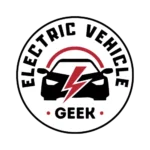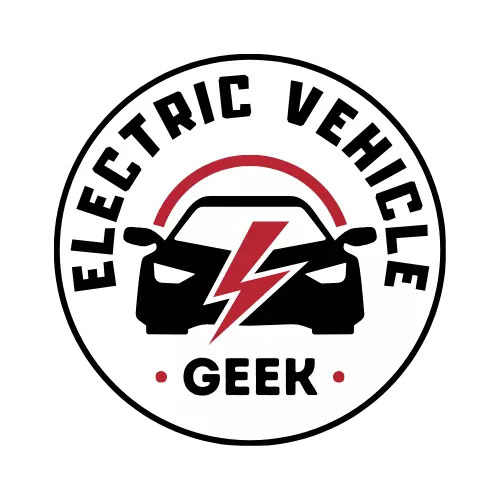There are several EV charger plug types and EV Charger connectors in the EV accessories market; unfortunately, not all of them are compatible with your EV; the number one factor determining which EV charger plug to use is the electric vehicle charging port type which should match with the EV charger connector.
Before rushing and purchasing every EV charger with a matching plug and connector, you should know other factors outside of the EV charger and outlet compatibility come into play: matching your electric vehicle charge rate, charging station matching plug, and electric vehicle outlet.
Here is a summary of the different types of EV Charger plugs and their corresponding connectors.
| EV Charging Plug | EV Charging Connector |
|---|---|
| SAE J1772 Plug (Type 1) | SAE J1772 Connector (Type 1) |
| Mennekes Plug (Type 2) | Mennekes Connector (Type 2) |
| CCS Type 1 Plug | CCS Type 1 Connector |
| CCS Type 2 Plug | CCS Type 2 Connector |
| CHAdeMO Plug | CHAdeMO Connector |
| GB/T Plug (GB/T – AC & GBT – DC) | GB/T Connector (GB/T – AC & GBT – DC) |
| NACS Plug (Formerly Tesla Plug) | NACS Connector (Formerly Tesla Connector) |
With this in mind, we are going to highlight different EV Charger plug types, EV charger Plug standards, EV charger connectors, Types of electric vehicle chargers and their form of plugs and power ratings, and what to look for in EV Charger Plugs when purchasing an EV Charger.
EV Charging Methods.
EV Charger Plug Types & Their Connectors are standardized for interoperability by the three main international organizations responsible for the standardization of EV charging infrastructures, including the International Electrotechnical Commission (IEC), the International Organization for Standardization (ISO), and the International Telecommunication Union (ITU).
EV Charger Plug Types & Their Charging Connector are standardized by the IEC 62196-1, a standardization applicable to EV Charging accessories such as plugs, EV charger installation socket-outlets, electric vehicle plug connectors, and charging cables.
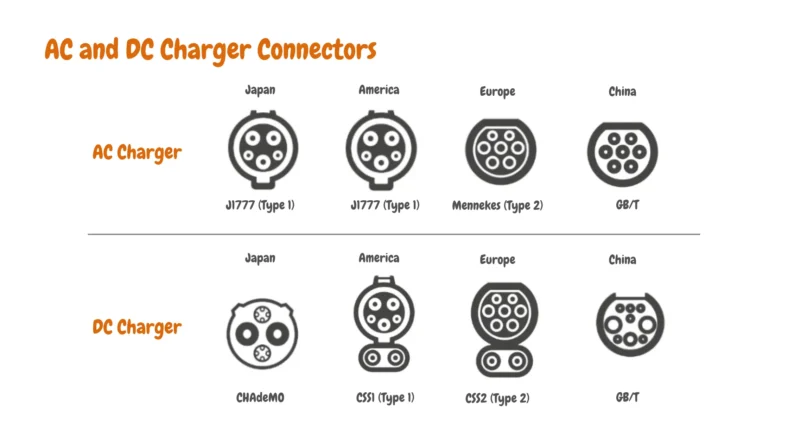
One of the main standardization features is the charging methods of an electric vehicle, and two charging methods determine the type of plug and connector to be used: AC (alternate current) charging and DC (direct current) charging.
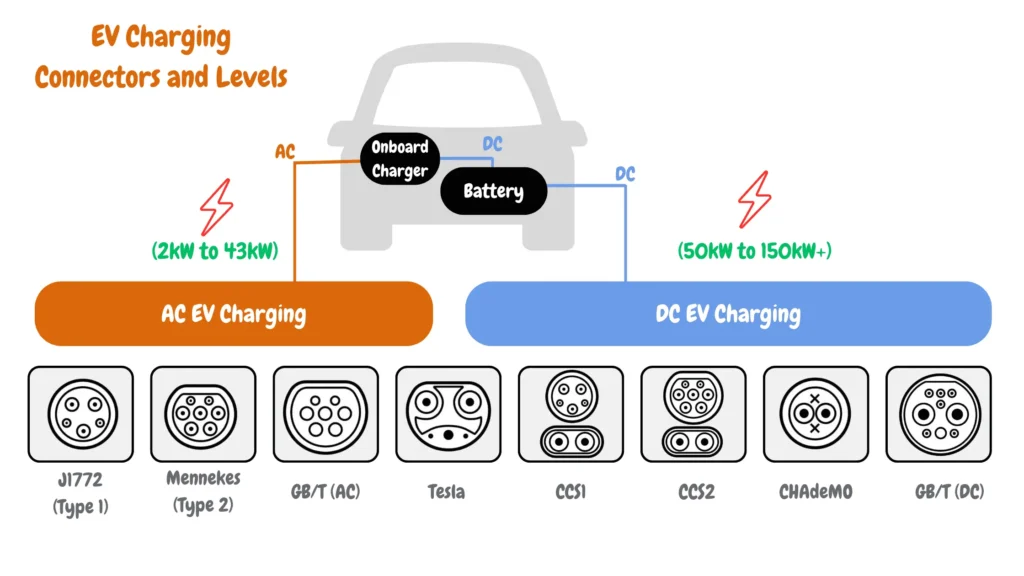
AC (alternate current) charging is the most common method used by Home EV Chargers. The main difference between AC charging and DC charging is that AC chargers rely on the electric vehicle onboard charger to convert AC to DC. At the same time, DC Charging has an included offboard charger in the DC fast station that sends DC power directly to the vehicle outlet and into the battery that always stores DC power.
The difference between AC and DC charging is shown in the infographic image below:

EV Charger Types
There are three kinds of chargers for electric vehicles that determine the type of EV charging plug and the corresponding connector; they include Level 1 chargers, Level 2 chargers, and Level 3 chargers.
Level 1 Chargers (SAE J1772)
Think of level 1 EV charger (SAE J1772) plug types & their charging connector as universal charging accessories that you can use on your home’s wall socket to charge your electric vehicle. Level 1 chargers EV charger plug types & their charging connector are used on standard 120v sockets.
Level 1 Chargers (SAE J1772) plugs and connectors are used on Level 1 chargers that take 40-50 hours to charge battery electric vehicles (BEVs) and 5-6 hours to charge a Plug-in-hybrid. (PHEVs) from 0-100%
We recommend purchasing Level 1 chargers EV charger plug types & their charging connector for home or emergency use but not for commercial charging stations or use in a smart EV charging environment.
Level 2 Chargers (IEC 62196)
Level 2 chargers (IEC 62196) EV charger plug types & their charging connector can be used on 220 and 240V connections and offer around 40 amps, making them fast EV Charging plugs and connectors compared to Level 1 EV plugs and connectors.
Since most homes in the United States receive 240V, we recommend charging your EV with a Level 2 charger if you need fast charging capabilities at home EV charging setup; they are also used in a smart EV charging environment.
Level 2 Chargers (IEC 62196) plugs and connectors are used on Level 2 chargers that take 4-10 hours to charge a BEV and 1-2 hours to charge a PHEV.
Level 3 Chargers – DC Rapid/Fast/Superchargers
We refer to Level 3 EV charger plug types & their charging connector as fast-charging DC EV plugs and connectors; the difference between Level 1 and Level 2 plugs and connectors with Level 3 plugs and connectors is that Level 3 plugs and connectors use DC while Level 1 and Level 2 plugs and connectors are used in an AC EV charging connection.
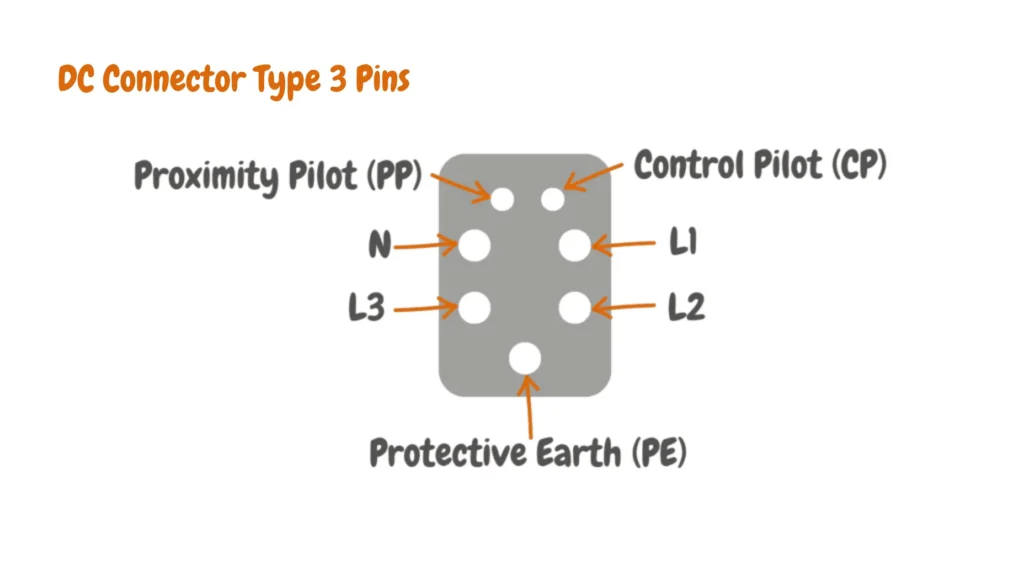
DC plugs and connectors offer 50-350 Kw and require much more power 480+V; level 3 plugs and connectors are ideal for commercial charging stations equipped for fast charging.
Level 3 plugs and connectors are DC fast plugs and connectors that can charge a BEV from 0-80% from 20 minutes to 1 hour; it is also important to note that most DCCF plugs and connectors are not used in most PHEVs.
Now that we know the factors that determine the EV Charger Plug Types & Their Connectors, which are the EV charging methods and the EV charger types, let’s look at the EV Charger Plug Types & Their Connectors used by electric vehicles.
EV Charger Plug Types & Their Charging Connector
Let the following EV Charger Plug Types & Their Charging Connector serve as a guide, offering you all the information you would need to know about the various EV Charger Plug Types & Their Charging Connectors in the market and how they differ.
The compatibility of electric vehicle connectors and vehicle inlets is highlighted in the table below:
| Electric Vehicle Inlet | Electric Vehicle Inlet | Type 1 Connector (J1772) | Type 2 Connector (Menneekes Connector) | Type 3 Connector | Configuration AA Connector | Configuration BB Connector | Configuration CC Connector | Configuration DD Connector | Configuration EE Connector | Configuration FF Connector | Universal High-Power AC/DC Connector | Universal High-Power AC/DC Connector |
| Basic Configuration Inlet | Type 1 Inlet (J1772) | Yes | – | – | – | – | Reserved | Reserved | – | – | – | – |
| Basic Configuration Inlet | Type 2 Inlet (Menneekes Inlet) | – | Yes | – | – | – | Reserved | Reserved | – | – | – | – |
| Basic Configuration Inlet | Type 3 Inlet | – | – | Yes | – | – | Reserved | Reserved | – | – | – | – |
| Direct Current Inlet | Configuration AA | – | – | – | Yes | – | Reserved | Reserved | – | – | – | – |
| Direct Current Inlet | Configuration BB | – | – | – | – | Yes | Reserved | Reserved | – | – | – | – |
| Combined AC & DC | Configuration CC | Reserved | Reserved | Reserved | Reserved | Reserved | Reserved | Reserved | Reserved | Reserved | Reserved | Reserved |
| Combined AC & DC | Configuration DD | Reserved | Reserved | Reserved | Reserved | Reserved | Reserved | Reserved | Reserved | Reserved | Reserved | Reserved |
| Combined AC & DC | Configuration EE | – | – | – | – | – | Reserved | Reserved | Yes | – | – | – |
| Combined AC & DC | Configuration FF | – | – | – | – | – | Reserved | Reserved | – | Yes | – | – |
| Universal High-Power AC/DC | – | – | – | – | – | Reserved | Reserved | – | – | Yes | – | |
| Universal High-Power AC/DC | – | – | – | – | – | Reserved | Reserved | – | – | – | Yes |
SAE J1772 Plug and SAE J1772 Connector (Type 1)
About 80% of electric vehicles and 85% of PHEVS come with an SAE J1772 Plug and SAE J1772 Connector (Type 1) electric vehicle charger, the SAE J1772 Plug and SAE J1772 Connector (Type 1), also known as the J Plug r the Type 1 Plug and connector, it’s a standard electric vehicle AC charging accessory common in the United States and Japan.
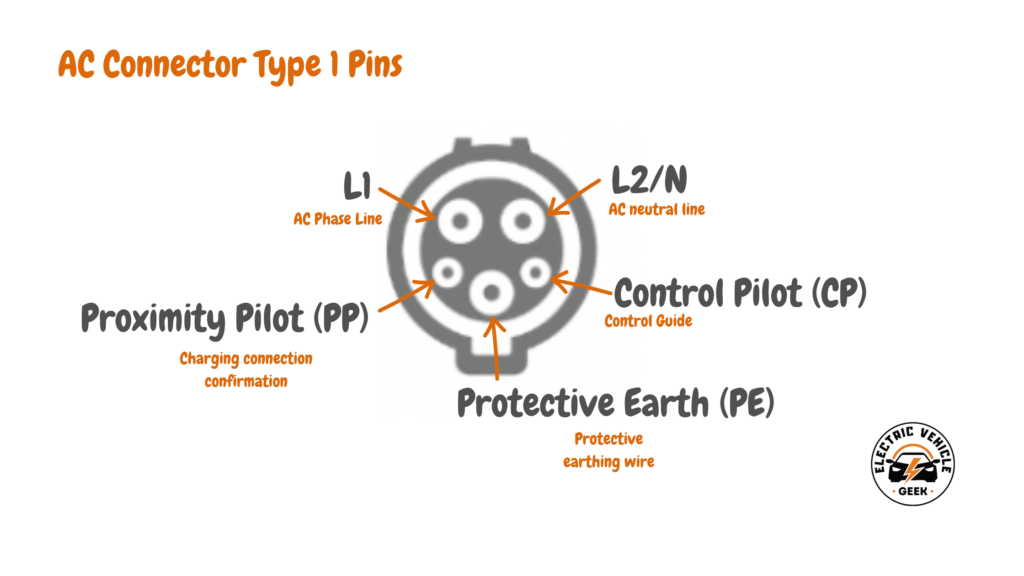
The differentiative feature of the SAE J1772 Plug and SAE J1772 Connector (Type 1) is the five pins that can be used on Type EV chargers capable of handling 1.44 kW at 120 volts.
The SAE J1772 Plug and SAE J1772 Connector (Type 1) are mainly used on Level 1 charging situations and are only compatible with single-phase EV charging installations.

Infographics image showing a SAE J1772 Plug and SAE J1772 Connector (Type 1)
Mennekes Plug & Mennekes Connector (Type 2)
Mennekes Plug & Mennekes Connector (Type 2) are fast charging EV charging accessories that are common in-home EV chargers, capable of handling 240 volts AC and a maximum power of 19.2 kW.
Most fast-charging EV Smart chargers use the Mennekes Plug & Mennekes Connector (Type 2). This is common in solar installations that need smart charging features and power grids supporting single-phase and three-phase AC charging for Level 2 AC chargers.
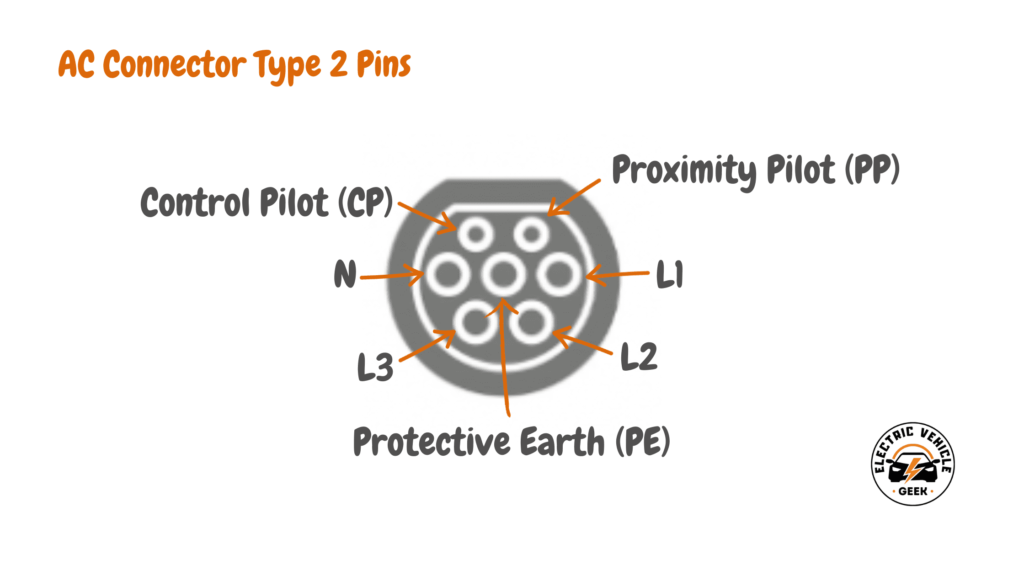
A common feature of the Mennekes Plug & Mennekes Connector (Type 2) is the seven pins and a locking mechanism that locks the plug into the EV inlet when plugged in for charging.
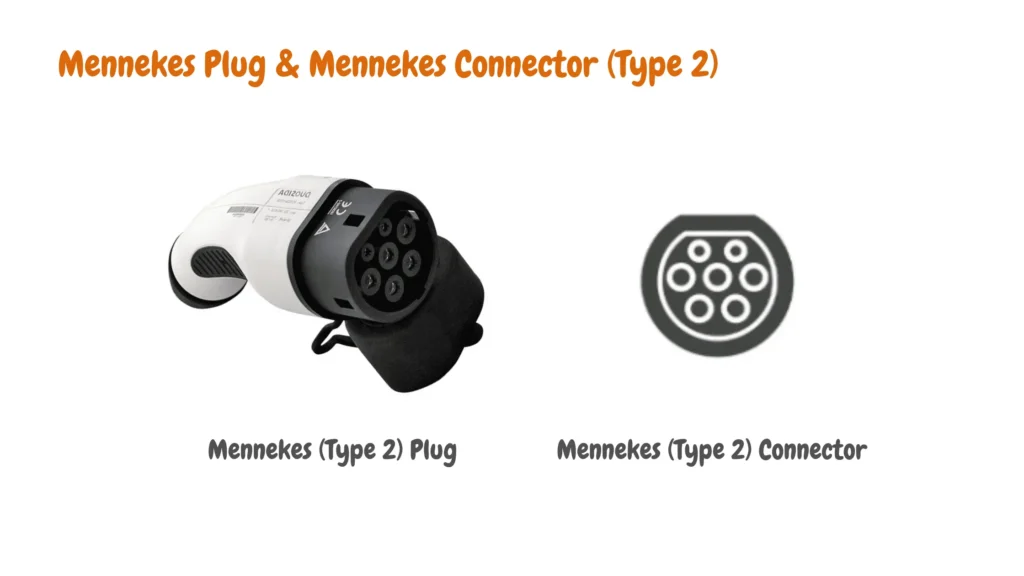
Infographics image showing Mennekes Plug & Mennekes Connector (Type 2)
CCS Type 1 Plug & CCS Type 1 Connector
A combined Charging System plug and connector are the most common EV fast charging accessories commonly found in fast charging EV home chargers and fast charging stations such as Electrify America, ChargePoint, or EVgo fast charging networks.
CCS Type 1 Plug & CCS Type 1 Connector are also known as EV CSS Combo plug and CSS Combo connectors; the CCS Type 1 Plug & CCS Type 1 Connector combines the J1722 Type 1 plug with two DC high charging pins, which is a differentiative feature of CCS Type 1 Plug & CCS Type 1 Connector.
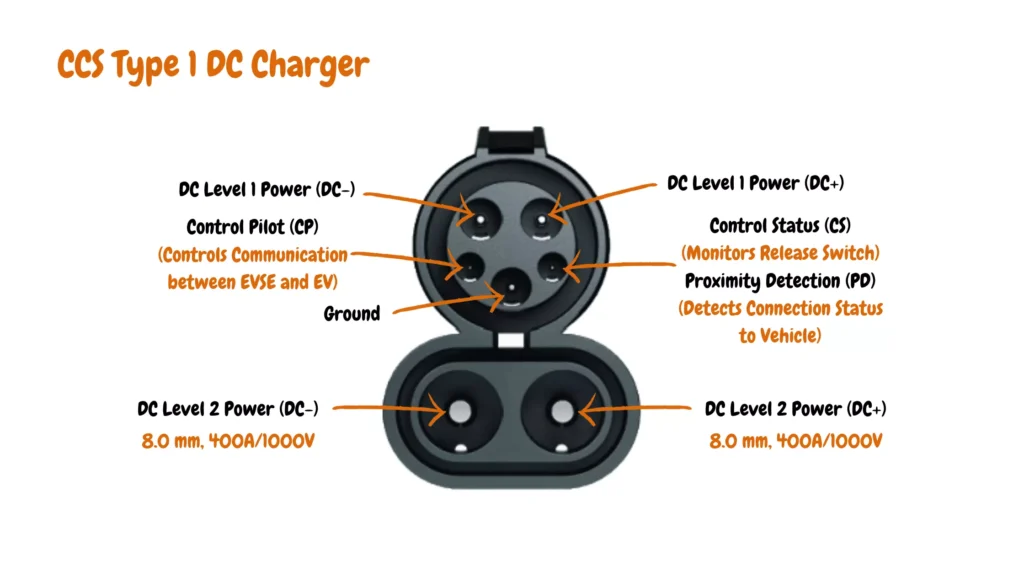
CCS Type 1 Plug & CCS Type 1 Connector supports DC power of 60-360 kW and AC power of 7.4 kW; the CCS Type 1 Plug & CCS Type 1 Connector is common in North America and supports most electric vehicles except Tesla and Nissan Leaf.
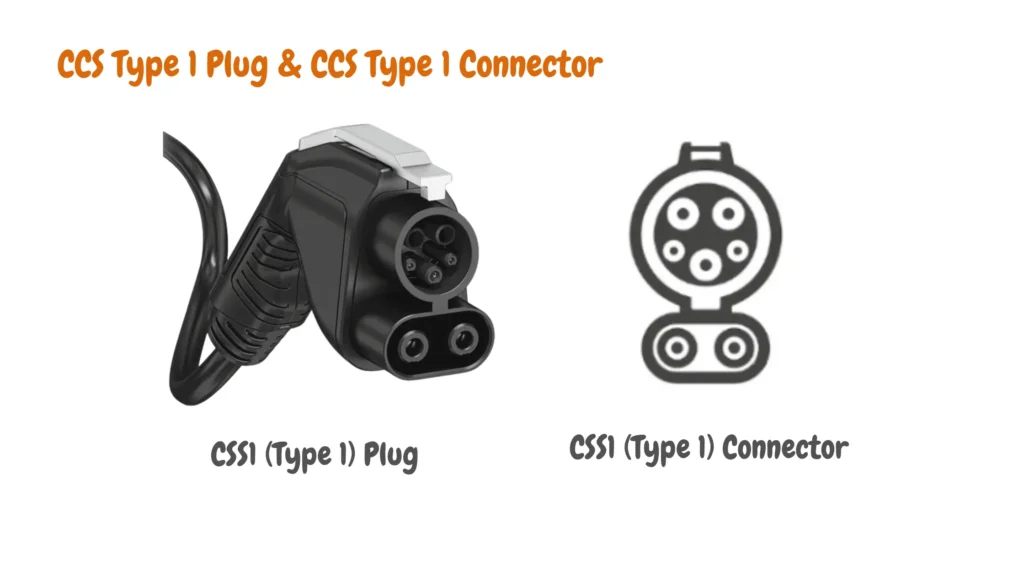
Infographics image showing CCS Type 1 Plug & CCS Type 1 Connector
CCS Type 2 Plug & CCS Type 2 Connector
CCS Type 2 Plug & CCS Type 2 Connector are newer versions of combined Charging System EV charging accessories. The CCS Type 2 Plug & CCS Type 2 Connector design allows for smaller AC and DC connectors and plugs compared to the CHAdeMO plug & CHAdeMO Connector.
The small compact designs of the CCS Type 2 Plug & CCS Type 2 Connector feature liquid cooling that allows fast Level 3 DC charging without overheating the EV charging cable; the design also features a locking mechanism that prevents disconnection from the electric vehicle when charging.
CCS Type 2 Plug & CCS Type 2 Connector supports up to 50-350 kW DC power and 22 kW (Private) AC Power, or 43 kW (Public) AC power; the CCS Type 2 Plug & CCS Type 2 Connector is common in Europe and support most EVs including newer models of Tesla.
CCS Type 2 Plug & CCS Type 2 Connectors can deliver up to 500 amps and 100V DC power; the liquid cooling features require liquid-cooled charging cables that allow delivery of more than 200 amps and apply to both CSS 1 and CSS2 plugs and connectors.
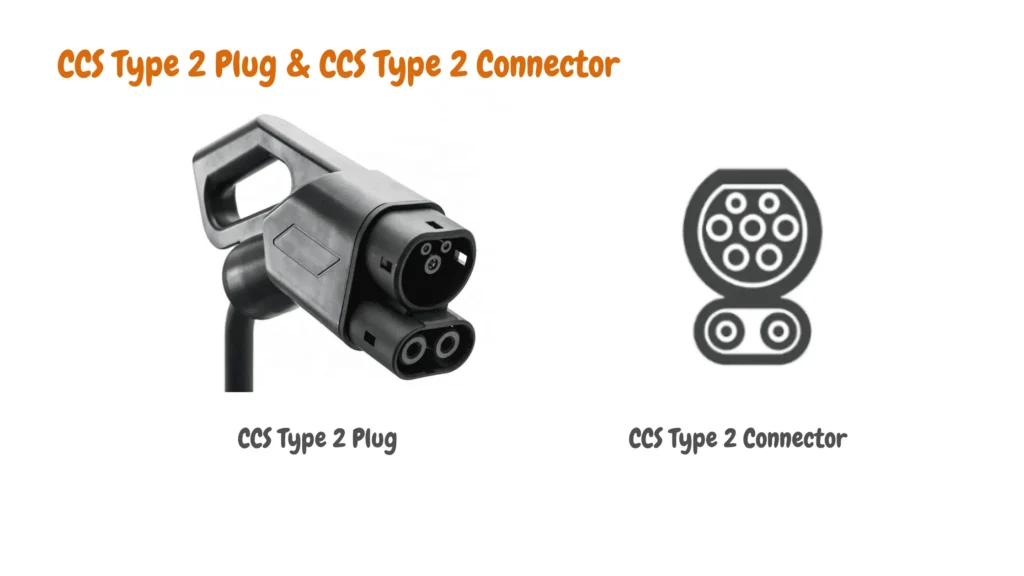
Infographics image showing CCS Type 2 Plug & CCS Type 2 Connector
CHAdeMO plug & CHAdeMO Connector
CHAdeMO plug & CHAdeMO Connector are EV accessories manufactured by the Tokyo Electric company; they are competitive EV accessories with the CSS EV accessories and are popular in Japanese markets and are common in Japanese electric vehicles such as Toyota, Mitsubishi, Subaru, and Nissan.
CHAdeMO plug & CHAdeMO Connector, also known as “CHArge de MOve,” is a playful play on words in Japanese, suggesting “charge for moving” and also a pun for “O cha demo image desu ka,” meaning “Let’s have a cup of tea while charging.”
CHAdeMO plugs & CHAdeMO connectors are used in DC fast chargers and electric vehicles and can charge up to 400 amps, providing 400 Kw. They are commonly used in the Nissan Leaf, an electric vehicle with a small battery, and the Hybrid Outlander Mitsubishi.
One of the features that you would find common in CHAdeMO and CSS plugs and connectors is the use of liquid-cooled cables that prevent overheating when charging with high power DC charging of 200amps and above.
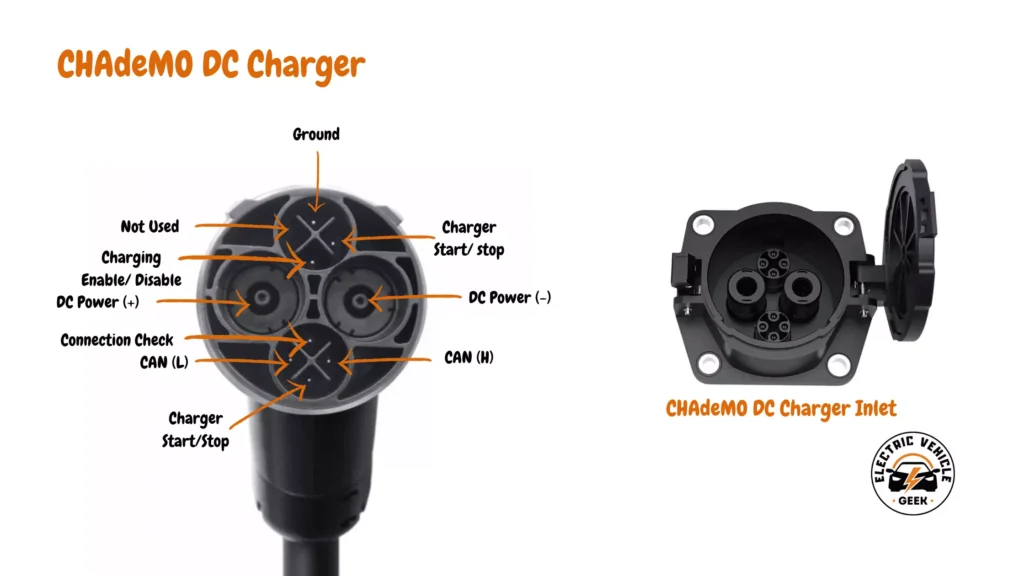
CHAdeMO plugs & CHAdeMO Connector feature a 10-pin design and use the CAN (Controlled Area Network) bus system to enable the communication of the electric vehicle and the DC fast charger and unlock smart charging features such as automatic authentication, charging control, and status monitoring.
In design differences, the CHAdeMO plug & CHAdeMO Connector are smaller than CCS plugs and connectors but bigger than the NACS plugs and connectors.
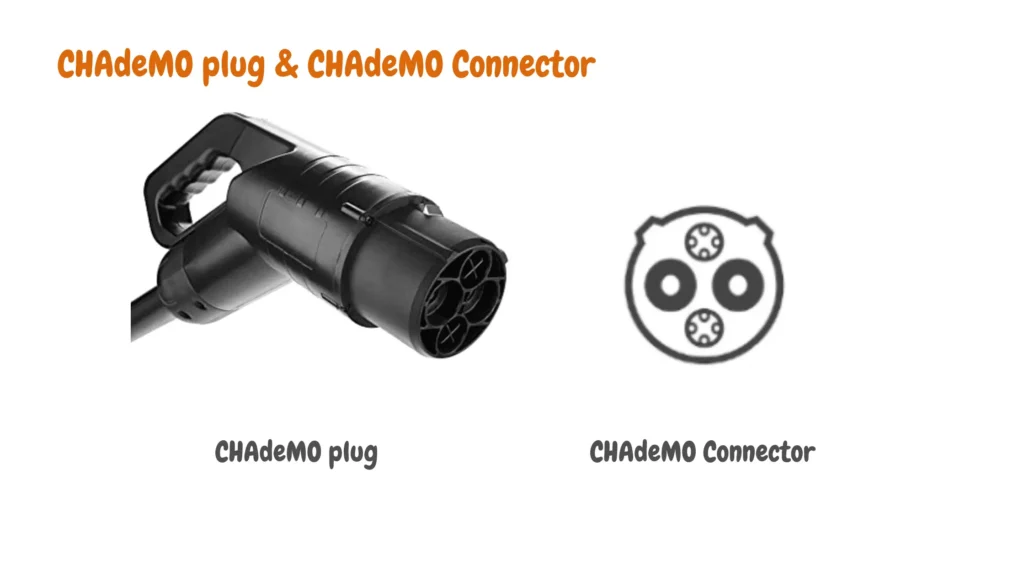
Infographic image showing the CHAdeMO plug & CHAdeMO Connector
GB/T Plug & GB/T Connector (GB/T – AC & GBT – DC)
GB/T Plug & GB/T Connector are commonly used in China for both Level 2 AC charging and Level 3 DC charging of electric vehicles.
GB/T Plug & GB/T Connector (GB/T – AC & GBT – DC) are EV charging accessories standardized by the Guabiao National Standards. There are two types of GB/T Plugs & GB/T Connectors: GB/T AC connectors and Plugs for AC Charging and GB/T DC used for DC charging.
GB/T Plug & GB/T Connector EV charging accessories can provide up to 7.4 kW of power output and a maximum output current of 32 amps on a single-phase Level 2 EV charging installation. On DC installation, the GBT – DC plug and connector can provide up to 237.5 kW of power output and 250 amps maximum output current for Level 3 DC charging.
Regarding design features, the GB/T Plug & GB/T Connector resembles the Mennekes plugs and connectors. It features seven pins for charging and GB/T 27930 communication protocol.
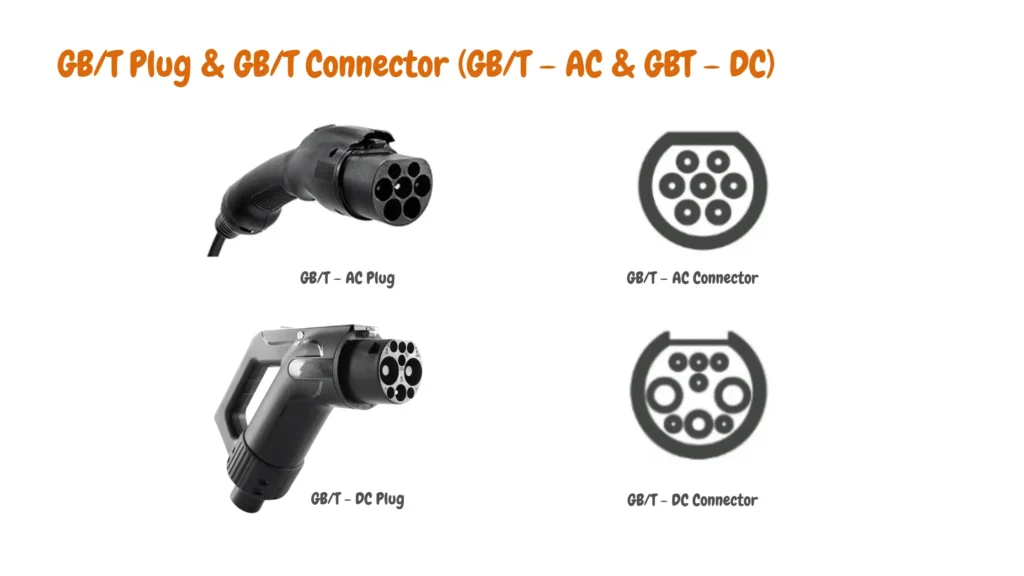
Infographics image showing GB/T Plug & GB/T Connector (GB/T – AC & GBT – DC)
NACS Plug & NACS Connector (Formerly Tesla Plug & Connector)
NACS (Tesla North American Charging Standards) Plug & Connectors are proprietary EV Charging accessories for Tesla electric vehicles.
Most of Tesla’s earlier models, such as the Tesla Model S, use a NACS Plug & NACS Connector, also known as the Tesla Supercharger plug and connector. The NACS plug and connectors can deliver up to 250 kW maximum power and 48-amp output current on AC Level 2 charging and a maximum output current of 400 amps on DC Level 3 charging.
Regarding design, the NACS plug and connectors are squarish oval connectors smaller than the CSS and CHAdeMo plugs and connectors. The NACS plugs and connectors feature a five-pin layout; the NACS plug connector has two primary pins that are used for AC and DC charging, and the DC+L1 pin provides DC power or AC by providing a Line 1 in split phase connection in single-phase installations.
All Tesla models use a NACS plug and connector except the Roadstar, Tesla Model 3, and Tesla Model Y. Both Tesla Model 3 AND Tesla Model Y are compatible with CSS Type 2 plugs and connectors.
Starting in the spring of 2024, other electric vehicle manufacturers such as Ford, General Motors, Mercedes-Benz, Nissan, Polestar, Rivian, Volvo, and Volkswagen will use NACS plugs and connectors.
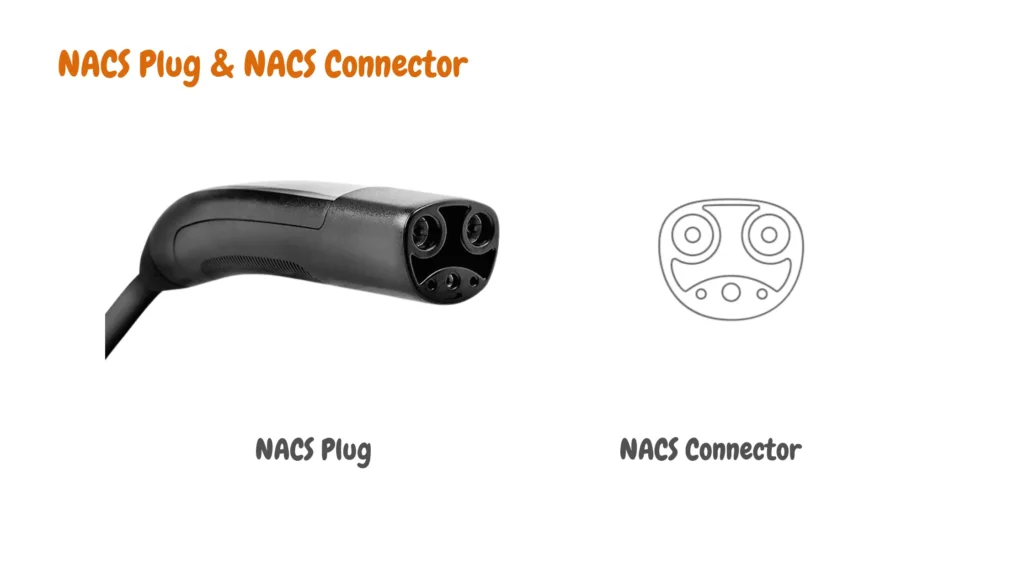
Infographics image showing NACS Plug & NACS Connector (Formerly Tesla Plug & Connector)
The user intent for someone searching for “EV Charger Plug Types” is likely to gather information about the various plugs used in electric vehicle (EV) chargers. Users may be interested in understanding the different standards and connectors associated with EV charging infrastructure, including details about charging speeds, compatibility with their EV model, and the availability of charging stations supporting specific plug types. This information helps users make informed decisions about charging their electric vehicles and The Basics of Plugging In an EV.

James Ndungu is a certified EV charger installer with over five years of experience in EVSE selection, permitting, and installation. He holds advanced credentials, including certification from the Electric Vehicle Infrastructure Training Program (EVITP) and specialized training in EV charging equipment and installation, as well as diplomas in EV Technology and Engineering Fundamentals of EVs. Since 2021, James has tested dozens of EV chargers and accessories, sharing expert insights into the latest EV charging technologies.
